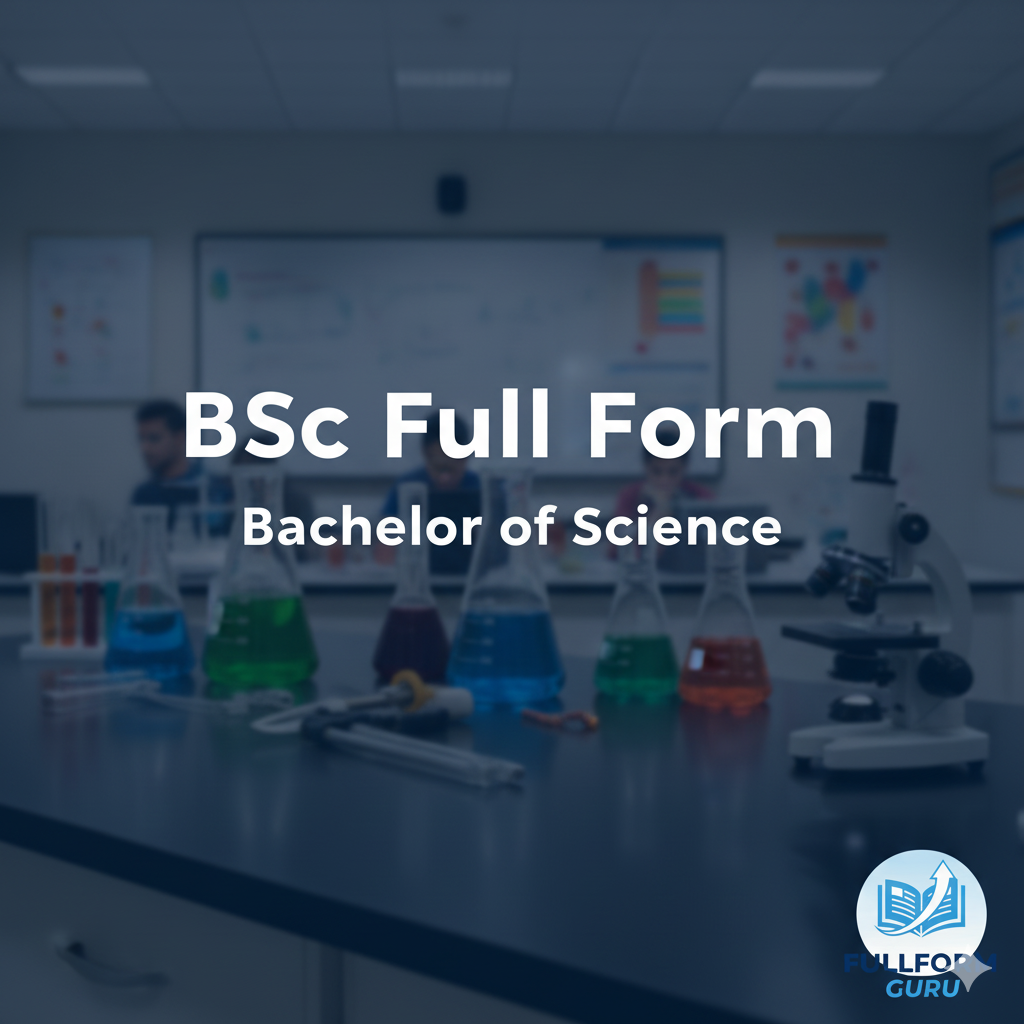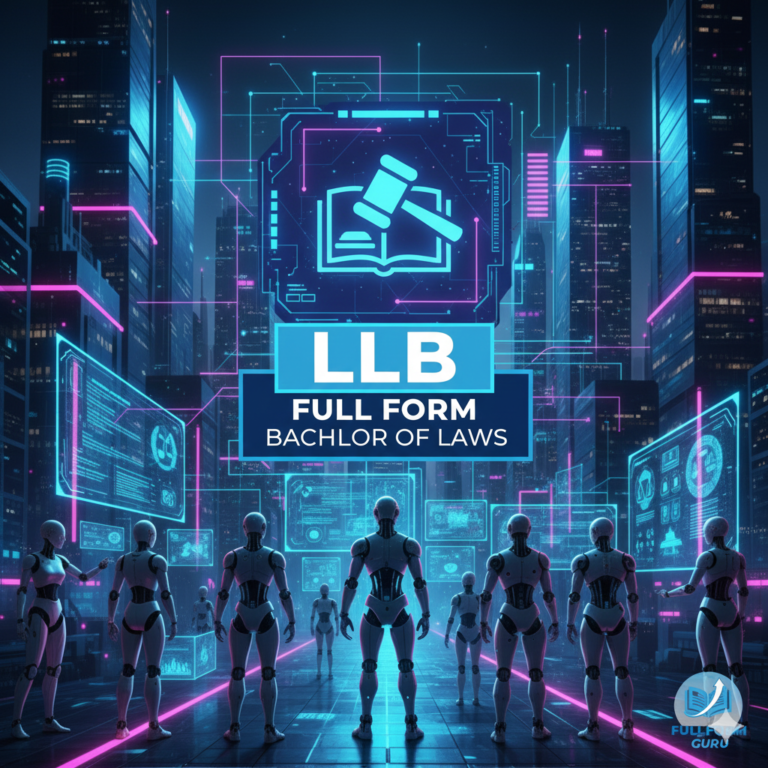
BSc Full Form: Courses, Eligibility, Specializations, and Career Opportunities
Introduction
The BSc Full Form is Bachelor of Science, Education has always played a crucial role in shaping an individual’s future, and among the most popular undergraduate programs worldwide is the BSc (Bachelor of Science). The BSc Full Form is Bachelor of Science, a program designed to provide a strong foundation in science, technology, and research. It is one of the most versatile degrees, opening doors to numerous academic and professional opportunities across diverse fields.
For example, medicine, technology, research, data science, and environmental studies.
Understanding the BSc Full Form helps students choose the right science career path according to their interests. This article explains the meaning of BSc, its eligibility criteria, popular specializations, course structure, benefits, and global career opportunities. It also highlights why pursuing a Bachelor of Science degree can be a valuable step toward building a successful and meaningful career.
What is the Full Form of BSc?
The BSc Full Form is Bachelor of Science, which is a degree focused on developing scientific knowledge and practical skills. It is an undergraduate academic degree awarded to students who complete studies in science or related disciplines. The BSc program focuses on developing analytical skills, logical reasoning, and scientific understanding.
BSc courses are available in both pure sciences and applied sciences, providing students with the flexibility to choose areas that align with their interests and career goals. The program typically includes theoretical learning, practical laboratory sessions, and research-based projects.
Types of BSc Courses
Universities usually divide BSc programs into two main types based on their academic system and focus area.
| Type of BSc Course | Description | Duration |
| BSc (General) | The program offers a comprehensive understanding of science subjects, including Physics, Chemistry, Mathematics, and Biology, without specialization. | 3 years |
| BSc (Honours) | Provides in-depth study and specialization in one main subject, for example, a BSc in Chemistry or a BSc in Computer Science. | 3 to 4 years |
It explains why the BSc Full Form is closely associated with strong academic and practical learning in the field of science. Both options are globally recognized, and the choice depends on the student’s future goals. Those aiming for research or advanced studies usually prefer BSc (Honours), while BSc (General) is ideal for students who want to explore multiple science fields.
Eligibility Criteria for BSc
The eligibility requirements for pursuing a Bachelor of Science degree vary slightly from one institution to another, but the general criteria include:
- Educational Qualification: Completion of grade 12 or equivalent examination from a recognized board.
- Stream Requirement: Students must have studied science subjects such as Physics, Chemistry, Mathematics, or Biology in high school.
- Minimum Marks: Most universities require a minimum of 50% marks in the qualifying examination.
- Entrance Exams: Some universities conduct entrance tests, while others offer admission based on merit.
- Age Limit: There is no specific age limit, so this is open to anyone who fulfills the academic criteria.
Knowing the BSc Full Form and eligibility criteria helps students prepare better for admission.

Duration and Course Structure
The duration of a BSc program typically ranges from three to four years, depending on the country and university. The course structure follows either a semester or an annual system.
A standard BSc curriculum includes:
- Core Subjects: Main science subjects like Physics, Chemistry, Mathematics, Biology, Computer Science, or Environmental Science.
- Elective Subjects: Additional topics that allow students to explore interdisciplinary knowledge.
- Practical Labs: Hands-on experiments that strengthen understanding of scientific theories.
- Projects and Research Work: Applied learning through small-scale research or data analysis.
- Internships: Optional training in research labs or industries for practical exposure.
Popular BSc Specializations
The Bachelor of Science degree offers a wide range of specializations, allowing students to focus on their preferred area of interest. Here are some of the most widely chosen fields worldwide:
- BSc in Physics – Study of matter, motion, energy, and fundamental laws of nature.
- BSc in Chemistry – Focus on chemical reactions, composition, and laboratory experiments.
- BSc in Mathematics – Emphasis on logic, problem-solving, and quantitative reasoning.
- BSc in Computer Science – Learning about programming, databases, and software development.
- BSc in Information Technology – Study of systems, networks, and cybersecurity.
- BSc in Biology – Exploration of living organisms and biological processes.
- BSc in Environmental Science – Study of ecological balance, conservation, and sustainability.
- BSc in Biotechnology – Combines biology and technology for innovations in health and agriculture.
- BSc in Nursing – Training in patient care, healthcare systems, and clinical skills.
- BSc in Agriculture – Study of crop production, soil science, and sustainable farming techniques.
Each specialization offers distinct opportunities in both employment and research sectors.
Subjects Covered in BSc Courses
The exact subjects vary by specialization, but the general structure includes both theoretical and practical components.
| Core Subjects | Practical Components |
| Physics | Laboratory Experiments |
| Chemistry | Analytical Tests |
| Biology | Microscopic Studies |
| Mathematics | Data Analysis |
| Computer Science | Programming and Coding |
| Environmental Studies | Field Research |
This balanced combination of theory and practice ensures a holistic understanding of science and its applications.
Benefits of Pursuing a BSc Degree
Understanding the BSc Full Form also helps students realize how this degree supports long-term academic and career growth.
Earning a Bachelor of Science degree offers numerous academic, professional, and personal benefits. Some of the most notable include:
- Strong Knowledge Base: BSc programs build a solid foundation in scientific principles.
- Wide Career Options: Graduates can work in education, research, healthcare, IT, and environmental sectors.
- Global Recognition: The degree is valued globally by both universities and employers.
- Pathway to Advanced Studies: Students can pursue MSc, MBA, or research-based programs after graduation.
- Skill Development: Enhances analytical thinking, problem-solving, data handling, and teamwork.
- Employment Readiness: Many BSc Full Form programs include internships or training to prepare students for professional roles.
- Affordable Education Option: Compared to technical or professional degrees, BSc courses are often more economical.

Career Opportunities After BSc
After completing a Bachelor of Science degree, students can explore a wide range of career options in both government and private sectors.
1. Higher Education and Research
- Master of Science (MSc)
- Master of Business Administration (MBA)
- Research Assistant or Project Fellow roles
- Doctoral programs for those interested in academic or laboratory research
2. Employment in Industries
- Pharmaceutical and Chemical Companies
- IT and Software Development Firms
- Healthcare and Diagnostic Laboratories
- Environmental Agencies and NGOs
- Educational Institutions
3. Government Jobs
Graduates can appear in public service examinations or work as:
- Scientific Officers
- Data Analysts
- Lab Technicians
- Research Assistants
- Educators in government colleges
4. Emerging Career Fields
The digital era has expanded opportunities for BSc graduates in areas like:
- Artificial Intelligence and Machine Learning
- Data Science and Analytics
- Cybersecurity
- Biotechnology and Bioinformatics
- Environmental Management
Comparison Between BSc and Other Degrees
| Feature | BSc (Bachelor of Science) | BCom (Bachelor of Commerce) | BA (Bachelor of Arts) |
| Focus Area | Science and Research | Business and Finance | Arts, Humanities, and Social Studies |
| Course Duration | 3 – 4 years | 3 years | 3 years |
| Key Skills | Analytical, Logical, Experimental | Accounting, Management | Communication, Creativity |
| Career Paths | Research, IT, Healthcare | Banking, Business | Media, Education |
This table shows that the BSc degree is ideal for students who are passionate about scientific exploration and innovation.
Global Scope of BSc
A BSc is an internationally recognized qualification. Many universities abroad offer opportunities for BSc graduates to continue higher education or work in global industries. Students with strong academic performance can apply for international scholarships and internships in countries like the United States, the United Kingdom, Canada, Germany, and Australia.
The demand for scientific and technical professionals continues to grow, making the Bachelor of Science degree a valuable global credential.
How to Choose the Right BSc Specialization
Choosing the right specialization is a key step that influences your career path. Consider the following points before finalizing your choice:
- Identify your academic strengths and personal interests.
- Research future job trends and demand in specific fields.
- Review the course content, duration, and the institution’s reputation.
- Evaluate potential for higher studies and research opportunities.
- Seek advice from mentors, teachers, or career counselors.
Conclusion
BSc stands for Bachelor of Science. It opens a world of opportunities for learners passionate about science, technology, and innovation. This degree not only strengthens your understanding of scientific concepts but also enhances your analytical and problem-solving abilities, which are essential for success in any profession.
Pursuing a BSc degree can open doors to exciting careers, higher education, and research opportunities worldwide. Whether you dream of becoming a data scientist, environmentalist, researcher, or educator, a BSc provides the foundation for achieving those goals. Remember, science is not just a subject—it is a way of understanding the world. By choosing the Bachelor of Science path, you are choosing curiosity, progress, and the power to make a difference. By understanding the BSc Full Form and selecting the right specialization, students can unlock strong academic and professional success.




